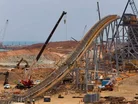Rio Tinto successfully completes 100km autonomous train journey

Rio Tinto continues to push the boundaries, bringing the Mine of The Future one step closer as it successfully completed the first fully autonomous train journey at its Pilbara operations in Western Australia.
The global resources giant successfully completed a 100km pilot run of its autonomous train, transporting iron ore minerals from Wombat Junction to Paraburdoo. As the train was completely unassisted, no driver involved, it represents the first ever fully autonomous heavy haul train journey to be completed in Australia.
The pilot was part of the company’s AutoHaul initiative, which falls under its much wider Mine of the Future programme, designed to “find advanced ways to extract minerals deep within the earth while reducing environmental impacts and improving safety.”
The journey was completed safely, being closely monitored in real-time by Rio Tinto teams and representatives of the Office of the National Rail Safety Regulator, both on the ground and at the Operations Centre in Perth.
The successful pilot run from Wombat Junction to Paraburdoo is a significant step toward full commissioning of AutoHaul® in 2018 once all relevant safety and acceptance criteria have been met and regulatory approvals obtained.
Rio Tinto Iron Ore chief executive Chris Salisbury said “This successful pilot run puts us firmly on track to meet our goal of operating the world’s first fully-autonomous heavy haul, long distance rail network, which will unlock significant safety and productivity benefits for the business.
“Gains from AutoHaul® are already being realised including reduced variability and increased speed across the network, helping to reduce average cycle times.
Related stories:
Health & safety key beneficiary in rise of IoT across mining sector
Unearthed Solutions heads to Vancouver with Teck and SRR Mining
Connected fleets and the smart mine
Mining global – September 2017
“Rio Tinto is proud to be a leader in innovation and autonomous technology in the global mining industry which is delivering long-term competitive advantages as we build the mines of the future. New roles are being created to manage our future operations and we are preparing our current workforce for new ways of working to ensure they remain part of our industry.”
Currently about 50% of Rio Tinto’s pooled fleet rail kilometres are completed in autonomous mode (with drivers on-board) and 90% of pooled fleet production tonnes are AutoHaul® enhanced.
Rio Tinto operates about 200 locomotives on more than 1,700 kilometres of track in the Pilbara, transporting ore from 16 mines to four port terminals.
Rio Tinto’s focus on automation technology and innovation is improving safety, is better for the environment and boosting productivity.
- Who is Rio Tinto’s New Chief Executive Officer Simon Trott?Operations
- Rio Tinto to Acquire Arcadium Lithium for $6.7bnSupply Chain & Operations
- Rio Tinto, BHP & Glencore 'Feeling the Pinch on Copper'Supply Chain & Operations
- Rio Tinto Brings Simandou Guinea Iron Ore Saga to EndOperations



